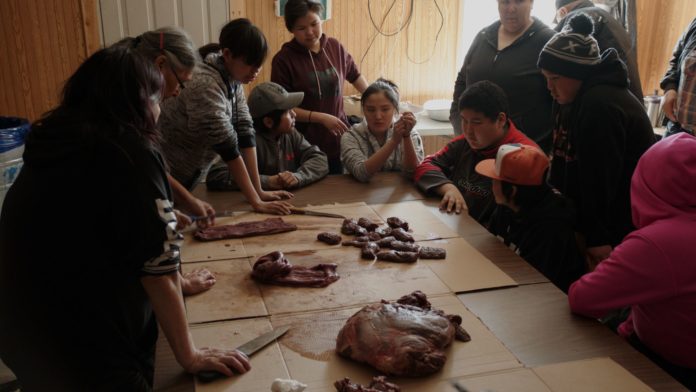
Ian Toews has filmed in some harsh weather conditions during his time as a documentary filmmaker, but nothing like what he endured for his most recent offering.
Toews, a Gemini Award-winning director, has braved the elements making films about everything from grasslands and buffalo to the Saskatchewan River Delta. However, his latest film, a documentary about chasing caribou in the north with a pair of Déné hunters, required a whole new level of hardiness.
“Going out on a hunt to make this film in minus-30, minus-35 degree conditions in the middle of February was something I was barely prepared for,” Toews chuckled from the warmth of southern Saskatchewan on Thursday. “I had some experience with that kind of thing before, but seeing the two Déné guys that came with us that did the hunting, it was just so impressive how resilient they are.”
Despite the challenges of stalking caribou and moose outside of remote northern communities like Stony Rapids, Fond-du-lac and Black Lake, Toews is extremely proud of the final product, called Etthén Heldeli: Caribou Eaters. The film is scheduled to open on Oct. 21 on CityTV Saskatchewan, and promises to give an insider’s look at a way of life that’s little known down south.
Due to changes in caribou migration patterns and declining herd numbers, Déné people from northern Saskatchewan often have to travel hundreds of kilometres into the Northwest Territories or Nunavut just to maintain their hunting traditions.
For the past 18 years, the Déné have been in negotiations with the Canadian government over Treaties 8 and 10, which governs things like access to migratory hunting grounds and culture sites.
“How they live, how they hunt, how they travel. That’s not as well known (in Saskatchewan) because those are really remote communities,” Toews explained. “To bring people in and let them have a glimpse at that lifestyle is a big goal of the film.”
Shooting documentaries brings its own level of difficulties, but that’s even truer when the focus is on hunting. Even without harsh weather, Toews said the challenge of capturing a caribou or a moose hunt of camera meant he had to be ready to film on a moments notice. Unlike other projects, there are no second takes when animals start crashing through the brush.
There were some benefits. In some cases, the cold weather and high snowdrifts actually made it a bit easier to track caribou. However, keeping up with the moose was a little more difficult.
“It has to be on and ready to go because you don’t get a second chance,” Toews said. “It’s not like we’re shooting a drama where the actor gets to walk out and hit and mark and do it 14 times until you get it right. You get one shot at it.”
For Toews, the extreme weather and the toughness of the Déné hunters are what stands out from his trip north. However, he also found warmth and community amidst the cold and the isolation. While the focus is on the hunters, Toews also gives viewers a glimpse into how traditions are passed down from generation to generation, and how important the caribou are to Déné culture.
Toews said it was a honour to see that aspect of the Déné community, and he hopes it comes through during the screening.
“It’s really about getting to see facets of a culture that are very rarely seen by outsiders, so I really hope that people are interested in it for that reason,” he said.
Etthén Heldeli: Caribou Eaters will be broadcast on CityTV at 10 p.m. CST on Sunday, Oct. 21. The documentary is the first production collaboration between 291 Film Company and Twisted Pair Productions. There are also plans to screen the film in a few northern communities, but no viewing dates have been set. For more information on the film, visit www.cariboueaters.com. A documentary trailer is also available on YouTube.

